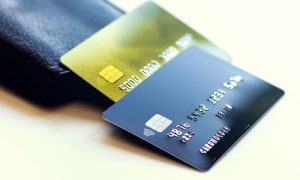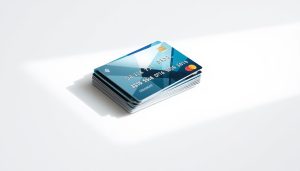Ever thought about how many financial chances you miss because of a bad credit score? Many believe a low score means no credit card for them. But, the truth is more detailed. Knowing how credit scores work, especially in Canada, is crucial.
This article will show you how to get a credit card even with bad credit. Many lenders now see the value in people with poor credit. They offer options to help you improve your financial situation. It’s time to take charge of your money!
Understanding Credit Scores
A credit score shows how good you are with money. It affects many financial choices, like getting loans or credit card rates. In Canada, scores range from 300 to 900, with higher numbers meaning better credit.
Things like how you pay bills, how much credit you use, and how long you’ve had credit matter. So does the type of credit you have and new credit checks.
If you have bad credit, knowing this is key. Missed payments or using too much credit can hurt your score. This makes it hard to get approved for credit.
But, improving your score can help. It’s important to keep an eye on your credit and manage it well. This way, you might get credit card approval even with bad credit.
Bad Credit and Its Implications
Knowing what bad credit means is key for anyone dealing with credit cards. A score under 580 is usually seen as bad credit. This can lead to big problems for cardholders. Companies like Equifax and TransUnion have their own ways of rating scores, but the effects are the same.
People with bad credit often pay more in interest. They also find it hard to get loans or mortgages. This is because lenders see them as riskier.
Getting a credit card with bad credit can be tough. Lenders think people with bad credit are more likely to default. This makes it hard to get approved for a credit card. It’s important to understand how your credit score affects your options.
By knowing this, you can make better choices about your money. This knowledge helps you plan for the future.
Types of Credit Cards for Those with Bad Credit
People with bad credit can still get credit cards. Secured credit cards are a common choice. They need a cash deposit as collateral. Using them wisely can help improve your credit score over time.
Unsecured credit cards are also available, but they might have higher interest rates and fees. These cards are easier to get than regular ones. Retail or store credit cards are another option. They have easier approval rules and offer discounts and rewards for shoppers.
Choosing the right credit card is key when you have bad credit. Look at interest rates, annual fees, and credit limits. Each person’s financial situation is different. Doing your homework helps you find the best card for your needs and improve your credit.
Steps to Improve Your Credit Chances
Improving your credit is key if you have bad credit. Start by checking your credit reports often. This helps find and fix any mistakes quickly. Keeping your report accurate is crucial for better credit.
Paying off debts is another big step. Reducing your credit use can really help your score. Focus on paying off high-interest debts first. This shows you’re serious about managing your finances.
Making payments on time is also vital. Paying bills on schedule shows you’re responsible. This builds trust with lenders and can help you get a credit card.
Building Credit Before Applying
Working on your credit before you apply for a credit card can really help. One good way is to become an authorized user on someone else’s card. This lets you use their good credit history to improve your own score. Often, this makes it easier to get approved for a credit card without a credit check.
Starting with personal loans or secured credit lines is another smart move. These options help you make payments on time. This is key for building a strong credit history. By doing these things, you set yourself up for success when you apply for credit later on.
How to Choose the Right Card
Choosing the right credit card is key for those with bad credit. It’s important to compare different options carefully. Look at fees, interest rates, and special features each card offers.
When searching for easy approval credit cards for bad credit, aim for fair terms and rates. Instant approval credit cards for bad credit might seem good, but check their costs closely.
Always read the fine print. Knowing all the terms and conditions helps avoid surprises. Some cards have hidden fees or high-interest rates that can hurt your finances. By reviewing each option well, you can pick a card that fits your financial needs and goals.
Prequalification vs. Preapproval
It’s important to know the difference between prequalification and preapproval, especially for those looking at credit cards for bad credit. Prequalification is the first step. It lets lenders check your financial info without hurting your credit score. This step gives you a hint about getting a credit card.
Preapproval means you’re more likely to get a credit card offer. It’s a deeper look at your credit history. This usually doesn’t hurt your score. Knowing this can help you choose which cards to apply for. For more on prequalification vs. preapproval, check out this resource.
Even though prequalification doesn’t mean you’ll get approved, it’s still useful. It helps you understand where you stand before you apply. This is especially helpful for those looking at guaranteed approval credit cards for bad credit.
Additional Options for Credit Access
People with bad credit might look into other ways to get credit besides traditional cards. Peer-to-peer lending platforms are becoming more popular. They connect borrowers with lenders directly, offering terms that fit individual needs.
Credit unions are another good choice. They are often more open to lending than big banks. This makes it easier for those with lower credit scores to get approved for credit cards.
Exploring these options can really help improve your credit access. It’s important to look into each choice carefully to find what works best for you.
The Role of Co-signers in Credit Applications
Getting a credit card with bad credit is tough. One way to help is by getting a co-signer. A co-signer, often someone with better credit, can boost your chances of approval. They show lenders you can pay back the debt.
Having a co-signer can make it easier to get approved. But, it’s important to think about the risks for both sides. The co-signer takes on part of the debt. Their credit score could drop if payments are late or the account is mismanaged.
It’s key to pick the right co-signer. They should have good credit and understand the risks. Both you and the co-signer must promise to handle credit responsibly. This way, it’s good for both of you.
Responsible Card Use for Bad Credit Holders
For those with bad credit, using credit cards wisely is key to getting back on track financially. Learning how to manage your credit card balances well can really help improve your credit score over time. One important step is to always make your payments on time.
Missing payments can make your credit score even worse, leading to higher interest rates and fees. To avoid this, setting up automatic payments is a good idea. If you prefer to pay manually, keeping a calendar or setting reminders can help you remember due dates.
It’s also important to keep an eye on how much you’re spending. Regularly checking your statements can help you avoid overspending and financial trouble. Another crucial step is to keep your credit utilization ratio low. Try to use no more than 30% of your available credit to keep your score healthy.
Finally, be careful not to apply for too many new credit cards at once. Each new application can hurt your credit score. By following these tips, you can start building a positive credit history. This will open doors to better credit opportunities in the future.
Moving Toward Financial Stability
Getting credit card approval with bad credit is a big step towards a better financial future. It’s key to set realistic financial goals to keep moving forward. Goals like building an emergency fund, paying off debt, or saving more can help a lot.
Getting help from credit counseling or financial literacy programs is also smart. Learning about money management can boost your credit score and teach you to spend wisely. Using the right resources can guide you on your path to financial stability.
Getting credit card approval is just the start. By focusing on setting goals and learning more, you can build a strong financial base. This approach not only improves your credit but also secures a brighter financial future.




